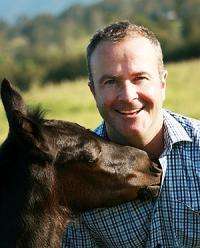How good are your horse's brakes?

Horseriding is a popular summer holiday activity, but few people know that horses kill more Australians annually than any other animal. Professor Paul McGreevy, from the University of Sydney's Faculty of Veterinary Science, is working on ways to 'check the brakes' on horses to ensure that they slow down on cue, saving both the horses and their riders.
As President of the International Society for Equitation Science and one of only three veterinarians recognised by the UK's Royal College of Veterinary Surgeons as a specialist in Veterinary Behavioural Medicine, Professor Paul McGreevy is keen to make horseriding as safe as possible for both the horses and humans.
"Horses in Australia play a unique role in work, sport and leisure contexts, but they can also be really dangerous, as horses have a tendency to have a 'flight' response to objects or events that threaten them," said Professor McGreevy.
"Animals can have a 'fight' or 'flight' response to a threat and horses tend toward the 'flight' response, in that their default response is to run first and ask questions later," explained Professor McGreevy.
"Most human casualties and fatalities in equestrian and racing contexts can be traced back to inappropriate flight responses from horses that cannot be stopped.
"So we're conducting research to find the best ways to decelerate any ridden horse reliably. Riders use reins connected to a bit in the horse's mouth to control the speed and direction of the horse, but it turns out that horses can become desensitised to the pressure from the bit, therefore making the bit less effective as a control mechanism."
Professor McGreevy and his team are identifying the distribution and causal factors of a diminished response to bit pressure in horses, with the hope of being able to identify horses most likely to bolt uncontrollably.
"Horse riders know that the most important question before riding an unfamiliar horse is whether or not it 'has brakes' - just like making sure a car you're about to drive has working brakes," said Professor McGreevy.
"Even though it's so important, we only have subjective ways of describing the 'brakes' on a horse - riders use terms like having a 'snaffle mouth' for horses that are sensitive to and respond to slight pressure on the bit.
"We're using new Australian technology called 'ReinCheck' - a simple, low-cost tensiometer that can be integrated between the reins and the bit - to measure interactions between any rider and their horse."
Measuring how much pressure has been applied to the horse's mouth and how it responds, allows Professor McGreevy to quantitatively assess the deceleration responses of horses.
"We already know that horse re-training centres find that the vast majority of so-called problem horses have decreased deceleration responses and have been exposed to relentless pressure or severe bits," said Professor McGreevy.
"We're planning on studying how horses respond to bit pressure across all of the main equestrian and racing disciplines, so we can explore the epidemiology of poor deceleration responses and hence the likelihood of flight responses becoming unmanageable."
To maintain a horse's sensitivity to rein stimuli, riders need to always use a light touch when pulling on the reins and release the tension immediately when the horse performs the required behavior. When horses have been continuously exposed to heavier handling, they become habituated to the pressure from the bit and less likely to slow down.
"It's really hard for riders, especially riders with less experience, to tell whether they are pulling too hard on the reins. So we really need an objective measure of this interaction between rider and horse to improve safety in riding horses," said Professor McGreevy.
"This gap in the horse riding industry is where we hope our research will have a huge impact."
Provided by University of Sydney


















